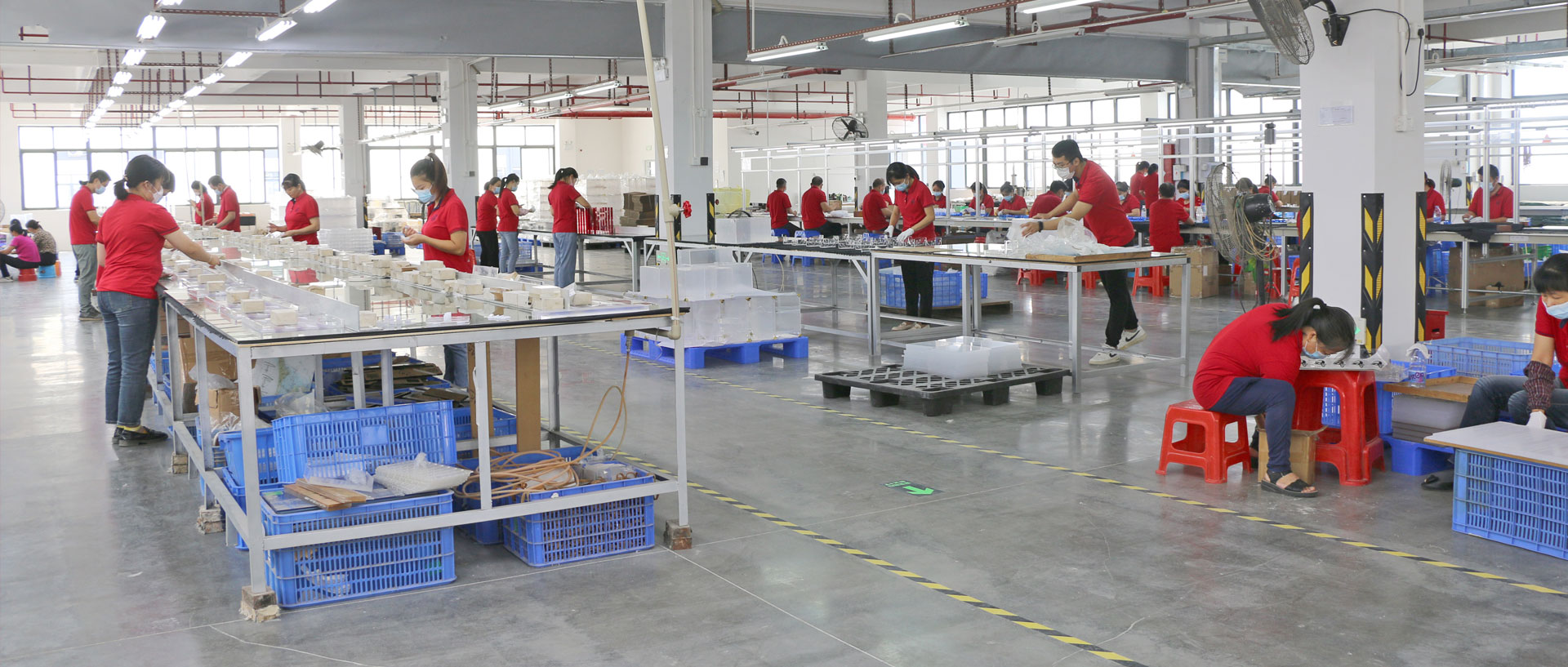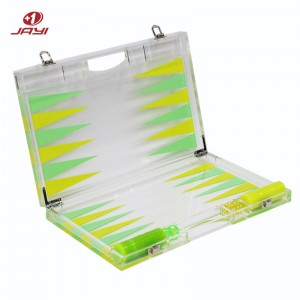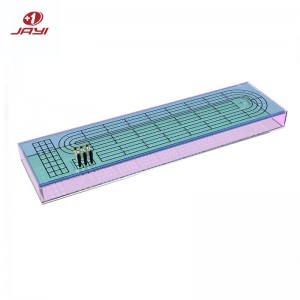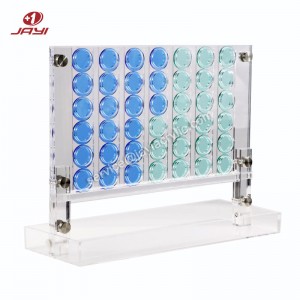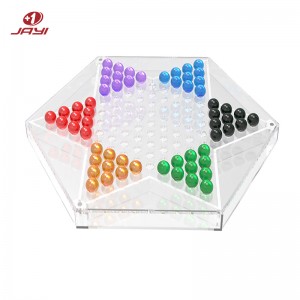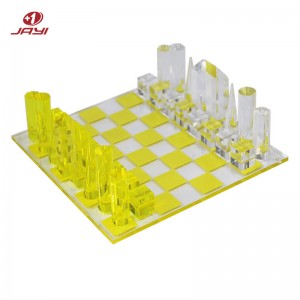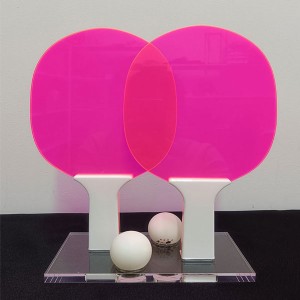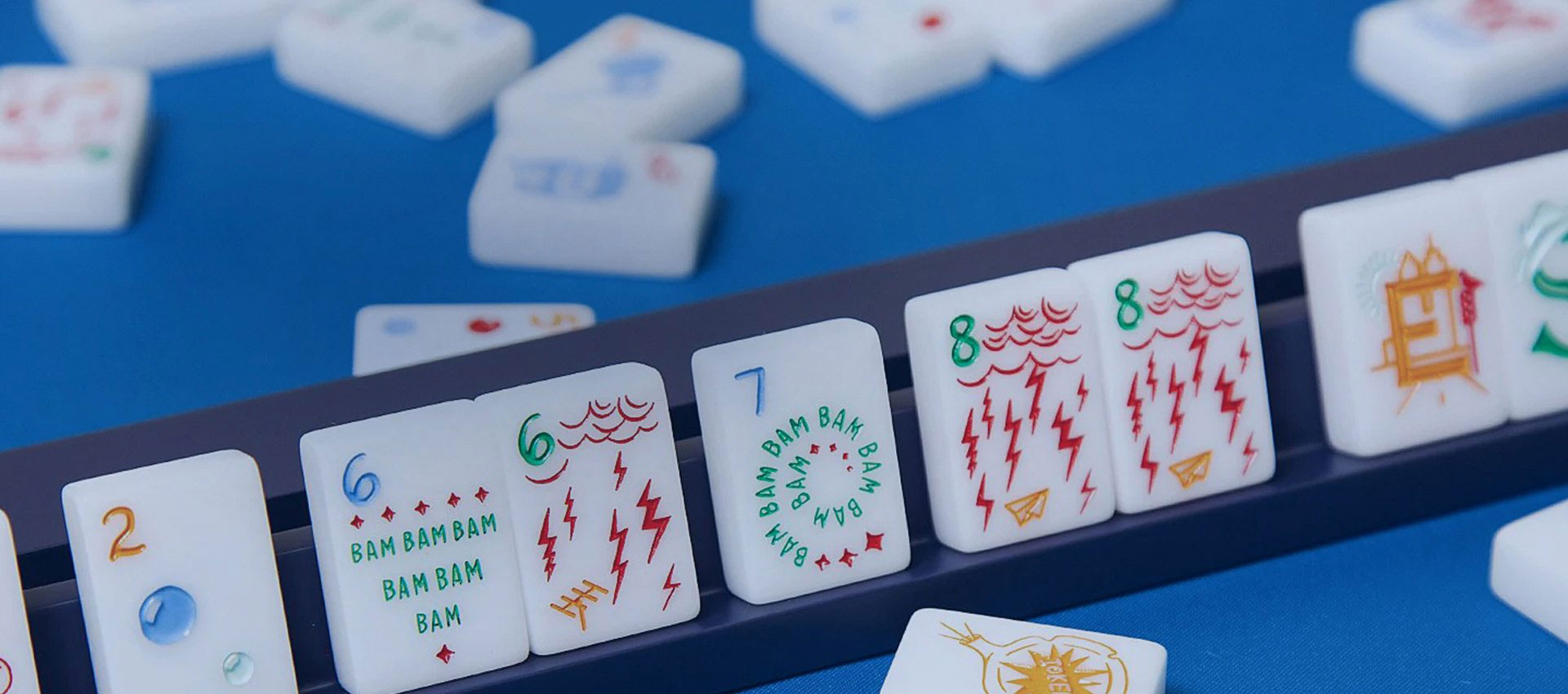
Custom mahjong sets are more than just gaming tools—they’re symbols of tradition, personality, and even brand identity.
Whether you’re designing a set for personal use, as a corporate gift, or to sell under your brand, the material you choose plays a crucial role in durability, aesthetics, and overall appeal. With options ranging from acrylic to wood, each material has its unique advantages and disadvantages.
In this guide, we’ll break down the most popular materials for custom mahjong sets, helping you make an informed decision based on your budget, brand vibe, and intended use.
Understanding the Key Factors in Mahjong Material Selection
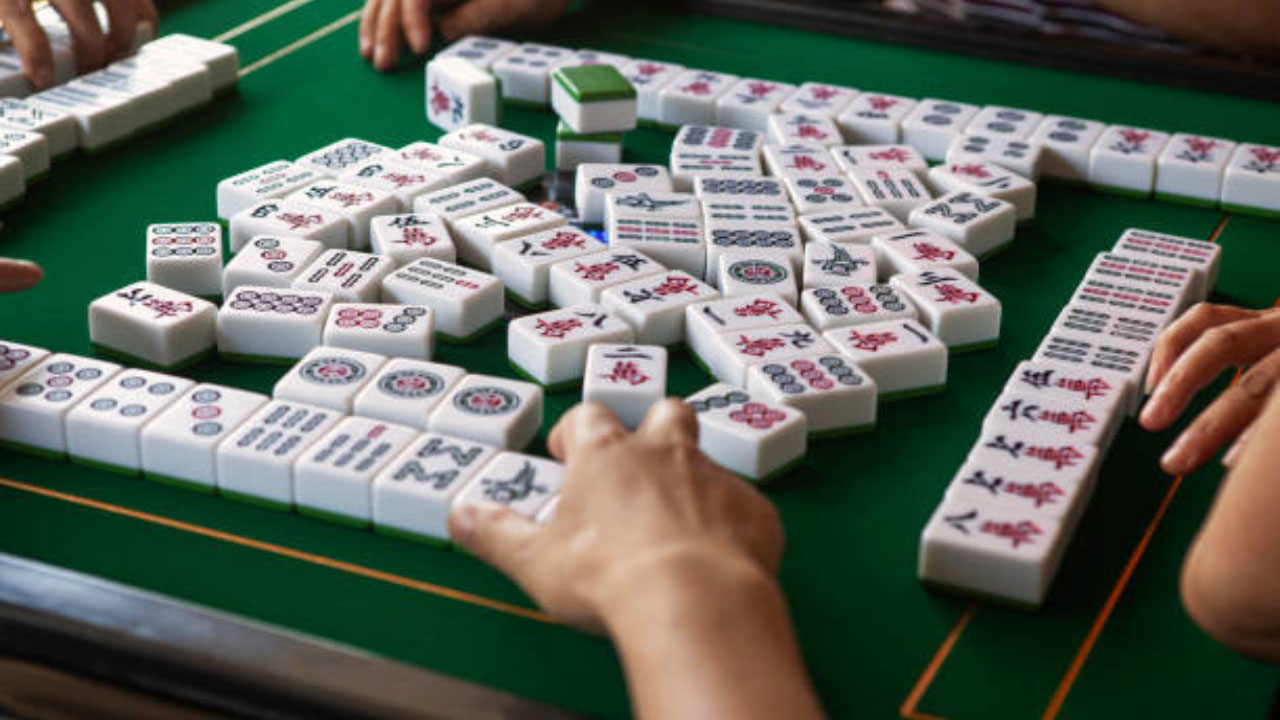
Before diving into specific materials, it’s important to outline the factors that should influence your choice:
Keep these factors in mind as we explore the most common materials for custom mahjong sets.
Popular Materials for Custom Mahjong Sets: Pros, Cons, and Best Uses
Choosing a mahjong set is not a one-size-fits-all process. It requires careful consideration of several factors, including the variant you play, tile material, size, accessories, portability, design, budget, and brand reputation. By evaluating each of these aspects, you can narrow down your options and find a set that will provide years of enjoyment.
1. Acrylic Mahjong Set
Acrylic has become a go-to material for modern custom mahjong sets, thanks to its versatility and sleek appearance. This synthetic polymer is known for its clarity, strength, and ability to mimic more expensive materials like glass or crystal.
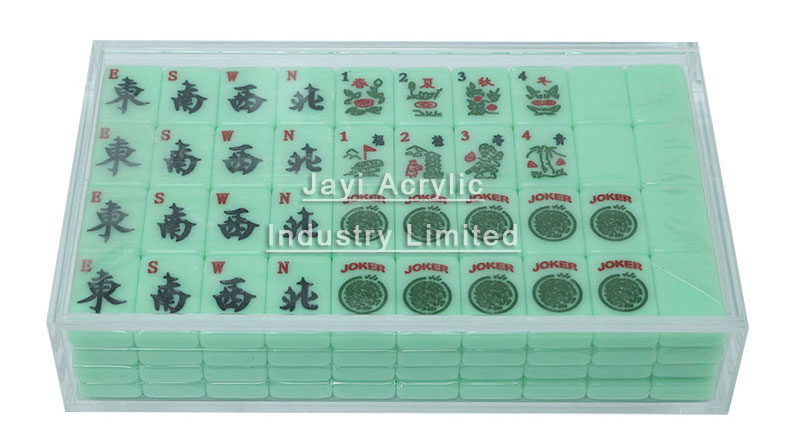
Pros:
Highly Customizable: Acrylic can be cut into precise shapes, dyed in vibrant colors, and engraved with intricate designs—perfect for bold logos or unique patterns.
Durable: It’s shatter-resistant (unlike glass) and resistant to minor impacts, making it ideal for sets that will see regular use.
Lightweight: Lighter than stone or metal, acrylic sets are easy to transport and handle during games.
Affordable: Compared to premium materials like jade or bone, acrylic is budget-friendly, especially for bulk orders.
Cons:
Prone to Scratches: While durable, acrylic can develop scratches over time, especially if not cared for properly.
Less Traditional: Its modern, glossy finish may not suit brands or individuals aiming for a classic, heritage-inspired look.
Affordable: Compared to premium materials like jade or bone, acrylic is budget-friendly, especially for bulk orders.
Best For:
For brands with a contemporary aesthetic, budget-conscious buyers, or casual/promotional mahjong sets, acrylic is ideal. Its sleek, glossy finish aligns with modern vibes, while vibrant color options and intricate engraving capabilities let brands showcase bold logos or unique patterns.
2. Melamine Mahjong Set
Melamine resin is a thermosetting plastic widely used in tableware and gaming accessories, including mahjong sets. It’s valued for its balance of durability and affordability, making it a popular choice for both personal and commercial sets.
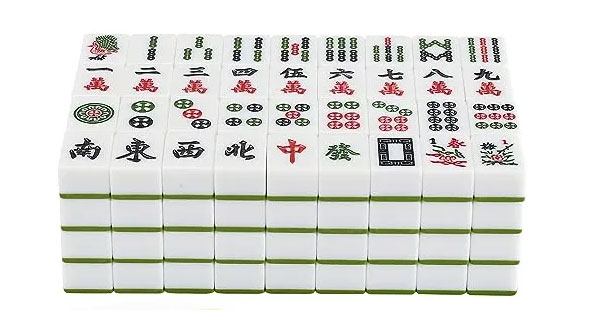
Pros:
Scratch and Stain Resistant: Melamine holds up well to daily use, resisting stains from food or drinks and maintaining its appearance over time
Heat Resistant: Unlike acrylic, it can withstand higher temperatures, making it more versatile for different environments.
Cost-Effective: Melamine is often cheaper than acrylic or wood, making it great for large-scale productions or tight budgets.
Smooth Surface: Its polished finish allows tiles to slide easily during play, enhancing the gaming experience.
Cons:
Limited Color Options: While melamine can be colored, it’s not as vibrant as acrylic, and intricate designs may fade over time.
Less Premium Feel: Its plastic-like texture may not convey luxury, which could be a drawback for high-end brands.
Best For:
For budget-focused projects, bulk orders, or heavy daily use (like in game rooms/cafes), melamine is ideal. It’s ultra-durable—scratch and stain-resistant, withstanding frequent use. Heat-resistant and cost-effective, it suits large-scale production. Its smooth surface enhances gameplay, though it lacks premium vibes. A practical, affordable choice for hardworking mahjong sets.
3. Wood Mahjong Set
Wooden mahjong sets exude warmth, tradition, and craftsmanship, making them a timeless choice for those who value heritage. From oak to bamboo (a grass, but often grouped with wood for its properties), different wood types offer unique aesthetics and characteristics.
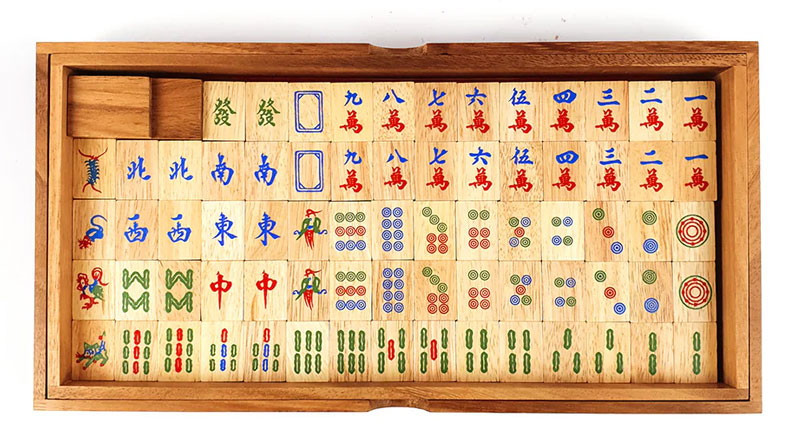
Pros:
Natural Beauty: Each wood type has a distinct grain pattern, adding uniqueness to every set. Woods like rosewood or walnut bring rich, deep tones, while maple offers a lighter, more minimalist look.
Durable: Hardwoods are resistant to wear and tear, and with proper care, wooden sets can last for generations.
Eco-Friendly: Sustainably sourced wood is a renewable material, appealing to environmentally conscious brands and buyers.
Premium Feel: Wood conveys luxury and craftsmanship, making it ideal for high-end gifts or brand sets aiming to project sophistication.
Cons:
Higher Cost: Quality hardwoods are more expensive than plastic alternatives, especially for rare or exotic varieties.
Maintenance Required: Wood can warp if exposed to moisture or extreme temperatures, requiring careful storage and occasional oiling.
Heavier: Wooden sets are denser than acrylic or melamine, making them less portable.
Premium Feel: Wood conveys luxury and craftsmanship, making it ideal for high-end gifts or brand sets aiming to project sophistication.
Best For:
For traditional brands, luxury gifts, or collectors’ mahjong sets emphasizing heritage and craftsmanship, wood is ideal. Its natural grain and warm tones exude timeless elegance, aligning with classic vibes. Hardwoods like rosewood offer durability, lasting generations with care. Though costly, their premium feel and artisanal appeal make them perfect for honoring tradition and appealing to discerning buyers.
4. Bamboo Mahjong Set
Bamboo is a sustainable, fast-growing material that’s gaining popularity for its eco-friendly credentials and unique look. While technically a grass, it’s processed similarly to wood and offers a distinct alternative.
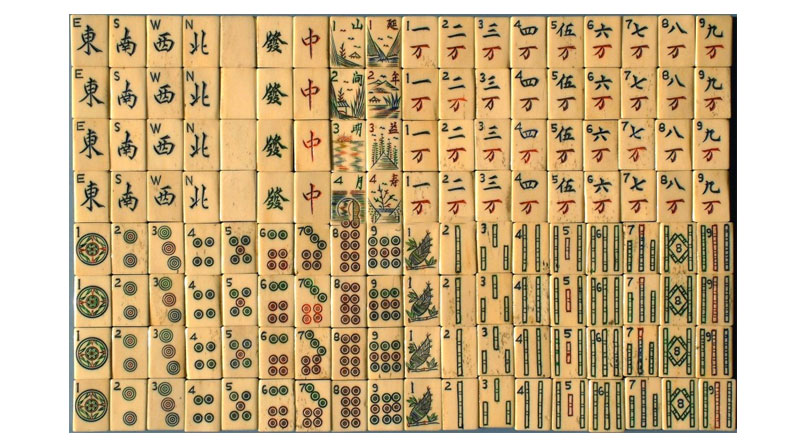
Pros:
Sustainability: Bamboo grows quickly and requires minimal resources, making it one of the most eco-friendly options available.
Lightweight: Compared to hardwoods, bamboo is lighter, improving portability while maintaining strength.
Unique Aesthetic: Its straight grain and light color give sets a clean, natural look, perfect for minimalist or eco-conscious brands.
Affordable: Bamboo is generally less expensive than exotic hardwoods, striking a balance between sustainability and cost.
Cons:
Less Durable Than Hardwood: Bamboo is less dense than oak or walnut, making it more prone to dents with heavy use.
Limited Staining Options: Its natural color is light, and dark stains may not adhere as evenly as they do to hardwoods.
Best For:
For eco-friendly brands, minimalist designs, or those wanting a natural look at a moderate price, bamboo is ideal. Its fast growth and low resource needs align with sustainability values. The light color and straight grain offer a clean, minimalist aesthetic. Lighter than hardwoods, it’s easy to handle. While less dense than wood, it balances durability and cost, fitting moderate budgets perfectly.
Comparing Mahjong Materials: A Quick Reference Table
To help you weigh your options, here’s a side-by-side comparison of the key features:
| Material | Durability | Cost | Aesthetic | Customization | Best For |
| Acrylic | High (shatter-resistant, scratch-prone) | Medium | Modern, glossy, vibrant | Excellent (dyes, engravings) | Contemporary brands, casual use |
| Melamine | Very High (scratch/stain resistant) | Low | Simple, matte, limited colors | Good (basic designs) | Budget projects, bulk orders |
| Wood | High (with maintenance) | High | Traditional, warm, natural grain | Good (carvings, stains) | Luxury, heritage brands |
| Bamboo | Medium (less dense than hardwood) | Medium-Low | Natural, minimalist, eco-friendly | Limited (light stains) | Eco-conscious brands, casual use |
Choosing Mahjong Material Based on Budget and Brand Vibe
Budget Considerations:
Under $50 per set: Melamine is your best bet, offering durability at a low cost. Bamboo can also fit here for smaller sets.
$50–$150 per set: Acrylic provides a balance of quality and affordability, with more customization options. Bamboo may fall into this range for larger or more detailed sets.
$150+ per set: Hardwoods like rosewood or walnut are ideal for premium, high-end sets that emphasize craftsmanship and tradition.
Brand Vibe:
Modern and Bold: Acrylic’s vibrant colors and sleek finish align with contemporary, youthful brands. It’s perfect for sets with bold logos or geometric designs.
Practical and Affordable: Melamine suits brands focused on functionality and accessibility, such as budget-friendly game retailers or corporate promotional items.
Traditional and Luxurious: Wood (especially hardwoods) caters to brands rooted in heritage, like luxury gift shops or cultural organizations aiming to honor mahjong’s history.
Eco-Conscious and Minimalist: Bamboo appeals to brands that prioritize sustainability and clean, natural aesthetics, resonating with environmentally aware consumers.
Final Tips for Custom Mahjong Set Success
Sample First: Order material samples to test durability, feel, and how your design translates before committing to bulk production.
Consider the User: If the set will be used outdoors or by children, prioritize durability (melamine or acrylic). For collectors, focus on premium materials (wood).
Align with Brand Values: Your material choice should reflect your brand’s mission—whether that’s sustainability, affordability, or luxury.
Conclusion
To create a custom mahjong set that shines and connects with your audience long-term, weigh each material’s pros and cons against your budget and brand identity.
Acrylic suits modern, budget-friendly needs; melamine works for heavy use and bulk orders. Wood fits traditional, luxury brands, while bamboo appeals to eco-conscious, minimalist ones.
Matching material traits to your goals ensures the set looks great and resonates for years.
FAQs
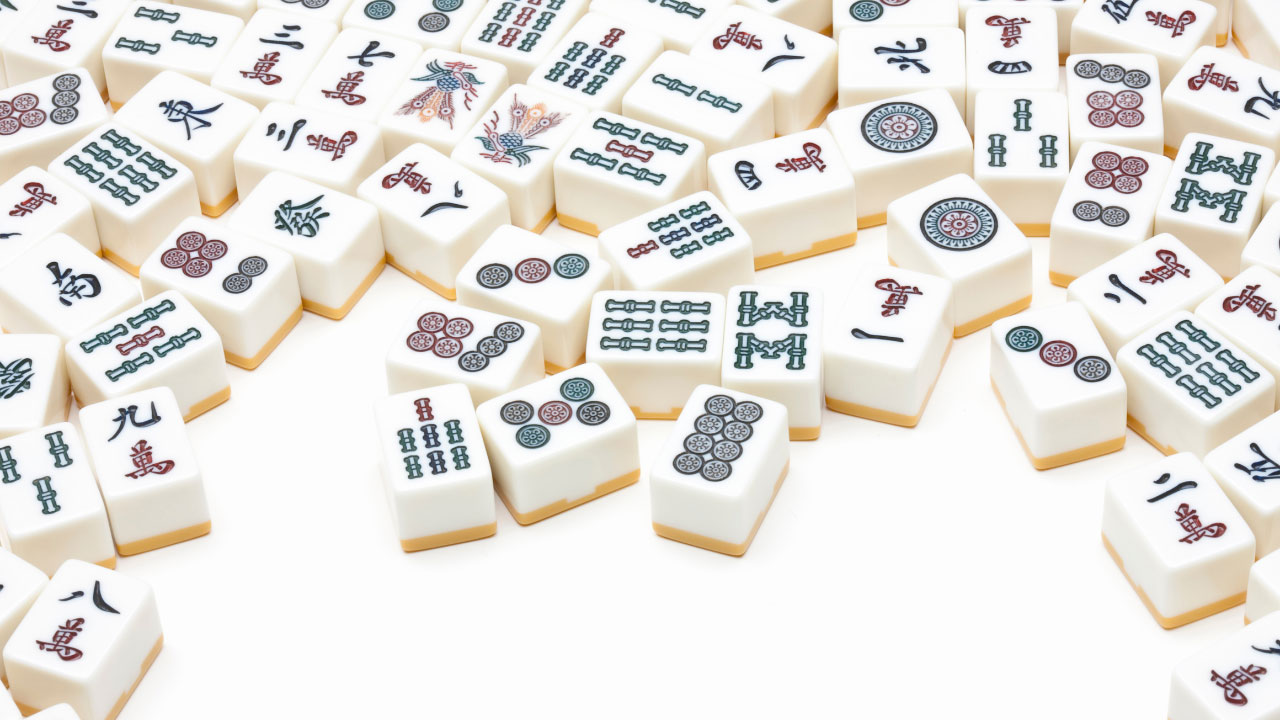
Which Material Is Best for Outdoor Mahjong Sets?
Melamine is ideal for outdoor use. It resists heat better than acrylic, avoiding warping in hot climates, and its stain resistance handles spills. Unlike wood or bamboo, it withstands moisture. While not as sleek as acrylic, its durability makes it perfect for outdoor games.
Can Wooden Mahjong Sets Be Customized with Logos?
Yes, wooden sets can be customized, but options are more limited than acrylic. They work well with carvings or stains to add logos or designs, leveraging the natural grain for a rustic look. However, intricate details may be harder to achieve compared to acrylic’s precise engravings.
Is Bamboo More Eco-Friendly Than Wood for Mahjong Sets?
Bamboo is often more eco-friendly. It grows faster and needs fewer resources than hardwoods, making it a renewable choice. Sustainably sourced wood is also green, but bamboo’s rapid regrowth gives it an edge for eco-conscious brands prioritizing low environmental impact.
What’s the Most Cost-Effective Material for Bulk Mahjong Orders?
Melamine is the most cost-effective for bulk orders. It’s cheaper than acrylic, wood, or bamboo, while still being durable enough for regular use. Its lower production costs make it ideal for large-scale projects, like corporate giveaways or budget retail lines.
Do Acrylic Mahjong Sets Feel Cheap Compared to Other Materials?
Acrylic sets don’t feel cheap, but they have a different vibe. Their glossy, modern finish is sleek, though less premium than wood. They’re lighter than wood but more durable than melamine, striking a balance that works for casual use without feeling low-quality.
Jayiacrylic: Your Leading China Custom Mahjong Set Manufacturer
Jayiacrylic is a professional custom mahjong set manufacturer in China. Jayi’s custom mahjong set solutions are crafted to enthrall players and present the game in the most alluring way. Our factory holds ISO9001 and SEDEX certifications, guaranteeing top-notch quality and ethical manufacturing practices. With more than 20 years of experience partnering with leading brands, we fully grasp the significance of creating custom mahjong sets that enhance gameplay enjoyment and satisfy diverse aesthetic preferences.
You Might Also Like Other Custom Acrylic Games
Request An Instant Quote
We have a strong and efficient team which can offer you and instant and professional quote.
Jayiacrylic has a strong and efficient business sales team that can provide you with immediate and professional acrylic game quotes. We also have a strong design team that will quickly provide you with a portrait of your needs based on your product's design, drawings, standards, test methods, and other requirements. We can offer you one or more solutions. You can choose according to your preferences.
Post time: Jul-29-2025

